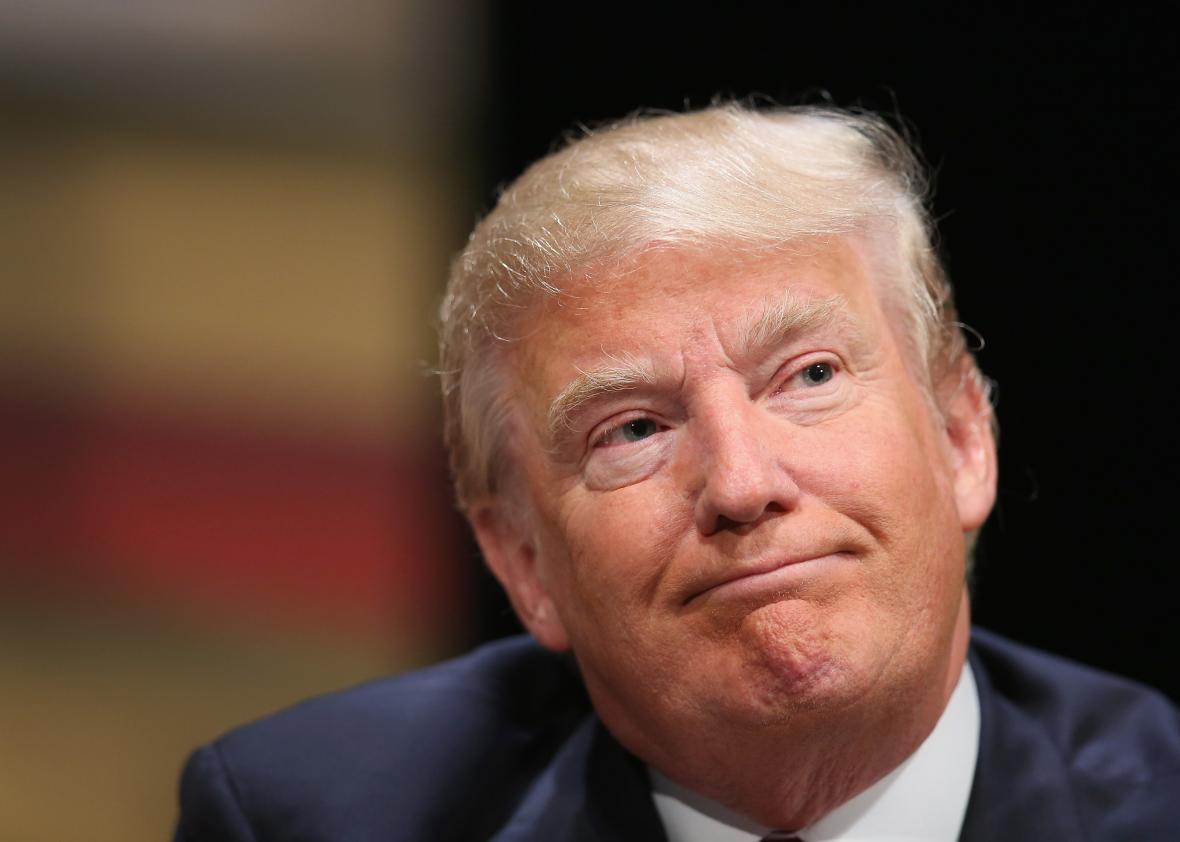While reporters dug into his paltry Federal Election Commission filing and Hillary attacked him from the stump, Donald Trump spoke to hundreds of Christian conservatives in New York on Tuesday, earning himself a standing ovation for a speech in which he promised to appoint anti-abortion Supreme Court justices, end the ban on churches politicking, and somehow force department store employees to say “Merry Christmas.” “You talk about religious liberty and religious freedom, you don’t have any religious freedom if you think about it,” he said with his usual “Me Tarzan, you Jane” approach to policy subtleties.
Also on Tuesday, Trump named an executive board to advise him on evangelical issues as he enters the general election. The roster includes Liberty University president Jerry Falwell Jr., former Christian Coalition leader Ralph Reed, former Southern Baptist Convention president Ronnie Floyd, former Focus on the Family president James Dobson, and about a dozen pastors. Former Minnesota congresswoman and presidential candidate Michele Bachmann is one of three women on the 26-person board.
Notice all those formers? The board is actually quite a ragtag bunch for a Republican in a general election—“a B-list of second-tier religious right figures along with a handful of peaked-long-ago relics,” as blogger Fred Clark put it. And the irony of these Moral Majority types prostrating themselves before Trump was laid beautifully bare in a photo Falwell proudly tweeted on Tuesday:
As many of Falwell’s followers gleefully pointed out, that’s a photo of Trump on the cover of Playboy in the background.
Still, with a pandering speech and a board stocked with familiar names, it’s easy to imagine this means Trump has the evangelical power-class vote sewn up. But that would be wrong. “This is a horrifying list, only vaguely representative of evangelical Christianity,” according to Warren Cole Smith, an influential evangelical commentator. “Mark Twain once said the difference between the right word and the almost right word is the difference between lightning and a lightning-bug,” he wrote in an email to CBS News on Tuesday. “This list, with a few exceptions, is made up of lightning-bugs. I’m sure the people who are on this list are on it because more leaders more representative of evangelicals refused to serve.”
Trump’s speech also earned scorn. Southern Baptist Convention policy head Russell Moore, arguably Trump’s loudest evangelical critic, did not attend, and he tweeted in disgust at the standing ovation:
Despite Trump’s efforts Tuesday, he remains an extremely divisive figure among evangelical leaders. A January poll of Republican pastors found just 5 percent planned to vote for Trump in the primaries, and there’s no evidence that he has won the rest of them over as he moves toward the general election. (In a smaller poll of evangelical insiders in May, half of them said they would never vote for Trump “no matter what.”) Some evangelicals who remain repulsed by his crude persona and ugly rhetoric have proposed abstaining from voting in the presidential election and focusing on down-ballot races. Washington pastor Thabiti Anyabwile has been using his blog, hosted by the conservative Gospel Coalition, to explain why he will be voting for Clinton over Trump. “I prefer the predictable over the unpredictable,” he wrote in May in a post that compared the race to Stalin v. Hitler. “I regard a President Trump the worse of the two evils before us.”
Trump’s speech Tuesday admittedly drew some big names as organizers and attendees, including Ben Carson, Mike Huckabee, and evangelist Franklin Graham. But tellingly, even those who appeared to enjoy the event remain wary. At a press conference afterward, eight of the organizers, including Family Research Council president Tony Perkins, spoke glowingly of his performance. But when they were asked to raise their hands if they were willing to endorse him, not a single one did.
